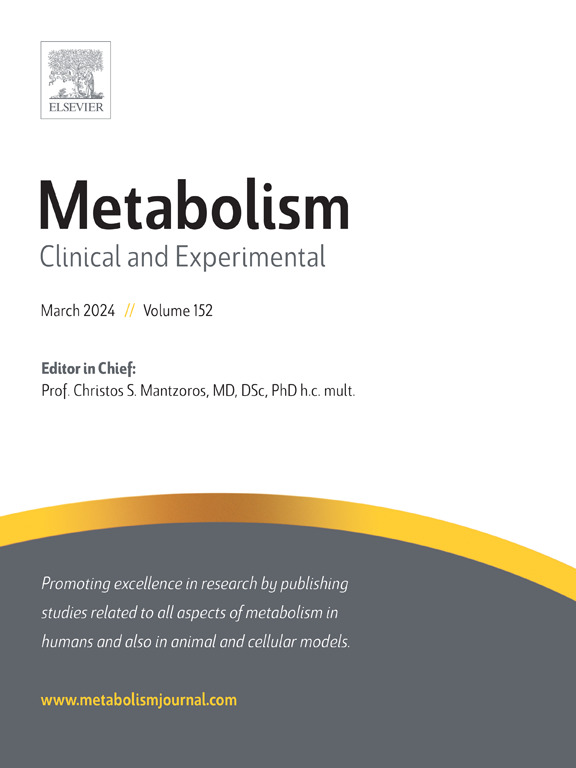Inhibiting IP6K1 confers atheroprotection by elevating circulating apolipoprotein A-I
IF 10.8
1区 医学
Q1 ENDOCRINOLOGY & METABOLISM
引用次数: 0
Abstract
Background and aims
Atherosclerotic cardiovascular diseases are the leading cause of death. Apolipoprotein A-I (apoA-I) mediates cholesterol efflux to lower the risks of atherosclerosis. Elevating circulating apoA-I is an effective strategy for atheroprotection. However, the regulatory mechanisms of apoA-I have been elusive.
Methods
Protein-protein interactions were examined by co-immunoprecipitations. Chemical biology tools were used to determine the binding of 5PP-InsP5 to its target proteins and its roles in mediating protein-protein interactions. The mouse atherosclerotic model was generated by injecting AAV-PCSK9 and feeding a Western diet. Atherosclerotic plaques were determined by Oil Red O and H&E staining.
Results
We show that blocking IP6K1 activity increases apoA-I production in hepatocytes. IP6K1 binds to apoA-I and via its product 5PP-InsP5 to induce apoA-I degradation, which requires ubiquitination factor E4A (UBE4A). Depleting 5PP-InsP5 by deleting IP6K1 or blocking IP6K1 activity disrupts the interaction between UBE4A and apoA-I, preventing apoA-I degradation, leading to increased production of apoA-I. Hepatocyte-specific deletion of IP6K1 elevates circulating apoA-I levels, which augments cholesterol efflux and lowers the burden of atherosclerosis. Mice with both apoA-I KO and hepatocyte-specific IP6K1 KO were generated to validate that IP6K1 deletion-induced atheroprotection requires apoA-I.
Conclusions
Our findings reveal a mechanism by which blocking IP6K1 boosts apoA-I production. Blocking IP6K1 represents a potential treatment strategy to elevate circulating apoA-I for atheroprotection.

抑制IP6K1通过提高循环载脂蛋白A-I来保护动脉粥样硬化。
背景和目的:动脉粥样硬化性心血管疾病是导致死亡的主要原因。载脂蛋白A-I (apoA-I)介导胆固醇外排以降低动脉粥样硬化的风险。提高循环apoA-I是动脉粥样硬化保护的有效策略。然而,apoa - 1的调控机制尚不明确。方法:用共免疫沉淀法检测蛋白-蛋白相互作用。使用化学生物学工具确定5PP-InsP5与其靶蛋白的结合及其在介导蛋白-蛋白相互作用中的作用。通过注射AAV-PCSK9和饲喂西式饮食制备小鼠动脉粥样硬化模型。采用油红O和H&E染色检测动脉粥样硬化斑块。结果:我们发现阻断IP6K1活性会增加肝细胞中apoA-I的产生。IP6K1结合apoA-I并通过其产物5PP-InsP5诱导apoA-I降解,这需要泛素化因子E4A (UBE4A)。通过删除IP6K1或阻断IP6K1活性来消耗5PP-InsP5会破坏UBE4A与apoA-I之间的相互作用,阻止apoA-I的降解,导致apoA-I的产生增加。肝细胞特异性IP6K1缺失可提高循环apoA-I水平,从而增加胆固醇外排,降低动脉粥样硬化负担。产生apoA-I KO和肝细胞特异性IP6K1 KO的小鼠,以验证IP6K1缺失诱导的动脉粥样硬化保护需要apoA-I。结论:我们的发现揭示了阻断IP6K1促进apoA-I产生的机制。阻断IP6K1代表了一种潜在的治疗策略,可以提高循环apoA-I以保护动脉粥样硬化。
本文章由计算机程序翻译,如有差异,请以英文原文为准。
求助全文
约1分钟内获得全文
求助全文
来源期刊

Metabolism: clinical and experimental
医学-内分泌学与代谢
CiteScore
18.90
自引率
3.10%
发文量
310
审稿时长
16 days
期刊介绍:
Metabolism upholds research excellence by disseminating high-quality original research, reviews, editorials, and commentaries covering all facets of human metabolism.
Consideration for publication in Metabolism extends to studies in humans, animal, and cellular models, with a particular emphasis on work demonstrating strong translational potential.
The journal addresses a range of topics, including:
- Energy Expenditure and Obesity
- Metabolic Syndrome, Prediabetes, and Diabetes
- Nutrition, Exercise, and the Environment
- Genetics and Genomics, Proteomics, and Metabolomics
- Carbohydrate, Lipid, and Protein Metabolism
- Endocrinology and Hypertension
- Mineral and Bone Metabolism
- Cardiovascular Diseases and Malignancies
- Inflammation in metabolism and immunometabolism
文献相关原料
公司名称
产品信息
索莱宝
Dexamethasone
索莱宝
Dexamethasone
 求助内容:
求助内容: 应助结果提醒方式:
应助结果提醒方式:


